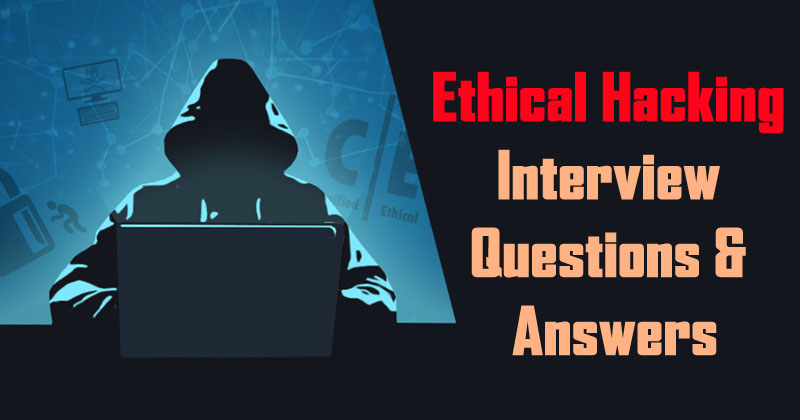
Top 10 Ethical Hacking Interview Questions And Answers
Top 10 Ethical Hacking Interview Questions And Answers: If you have hacking skills, you can turn your ethical hacking into a career. Ethical hacking is when a person is allowed to hack the system with the permission of the system owner to find any existing vulnerabilities in a system later fix them.
We have already published few articles in which we discussed several ways to learn Ethical hacking. If you have good hacking skills then you can apply for any security related jobs, like security researcher.
Related: 5 Best YouTube Channels To Learning Ethical Hacking
You can use your ethical hacking skills to protect companies against malicious hackers. However, if you have just decided to apply for a job as a security researcher then you need to go through an interview.
Table of Contents
Top 10 Ethical Hacking Interview Questions And Answers
Here in this article, we are going to describe few questions you may come across in an interview for the position:
1) What is an IP address?
Answer: An IP address is a virtual number assigned to a computer. This is the address used by the TCP / IP protocol to identify a computer on the network. A computer must have a unique IP address or an IP conflict error will occur.
2) What is a MAC address?
Answer: The MAC address is the physical address of the computer. This address is also unique and is tied to the IP address when the IP is assigned to your computer the MAC and IP addresses work together to identify a computer on the network. The main difference is that the MAC address is a physical address and the IP address is a virtual address.
3) What is footprinting or footprint traces?
Answer: Footprints leave a trail for ethical hackers to investigate. A footprint can be a physical file or traces on social media. A user can leave a footprint of their domain registration.
Related: Top 5 Best Websites To Learn Ethical Hacking For Beginners
4) What is a brute force tool?
Answer: A brute force is a tool that attempts to “guess” a password and user using a dictionary. A brute force attack takes a long time, but it uses every value that exists in the dictionary.
5) What is a denial of service (DDoS) attack?
Answer: There are phishing attacks that trick people into sending data through a website or a form that looks like a bank site. Baiting is also a type of attack that fools people into entering information into a malicious website.
6) What is network sniffing?
Answer: Network sniffing reads packets of data sent over a network between a user and the web server. Sniffing can be combated using SSL or encryption when communicating with a web server.
7) What is a rogue DHCP server?
Answer: A rogue DHCP server can redirect IP address assignments to allow the hacker to identify and redirect the client computer to another network segment. The hacker can then capture network traffic from the target machine.
8) Describe Some Other Attacks
Answer: There are phishing attacks that trick people into sending data through a website or a form that looks like a bank site. Baiting is also a type of attack that fools people into entering information into a malicious website.
9) What is SQL injection?
Answer: SQL injection is a type of tool that sends SQL commands to a server. The SQL injection attack executes commands on the server and either inserts data or returns data to the attacker.
10) Describe a tool that you use in ethical hacking?
Answer: Wireshark is a penetration testing tool that allows you to capture network traffic and identify malicious packets for testing and security purposes.
These are the ten common questions you may come across in an interview for the position. Hope you like the article, share it with others also.


